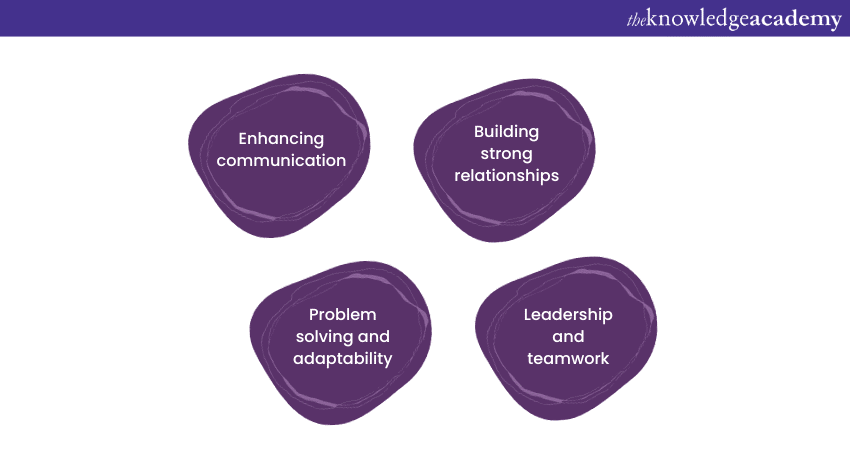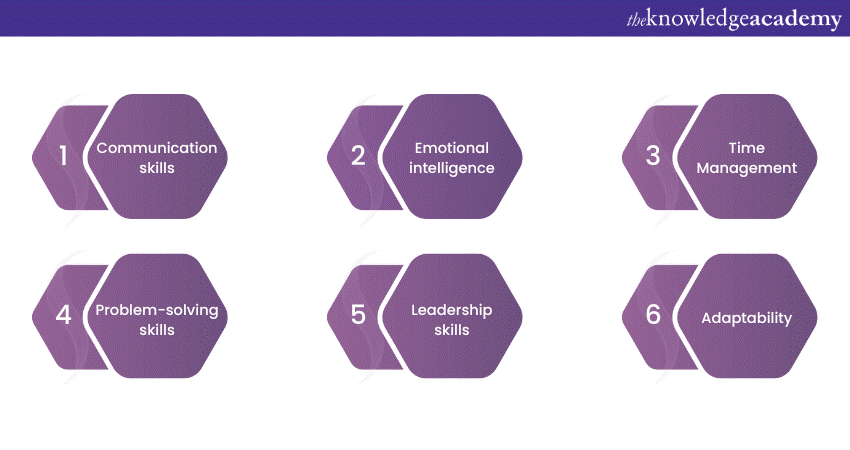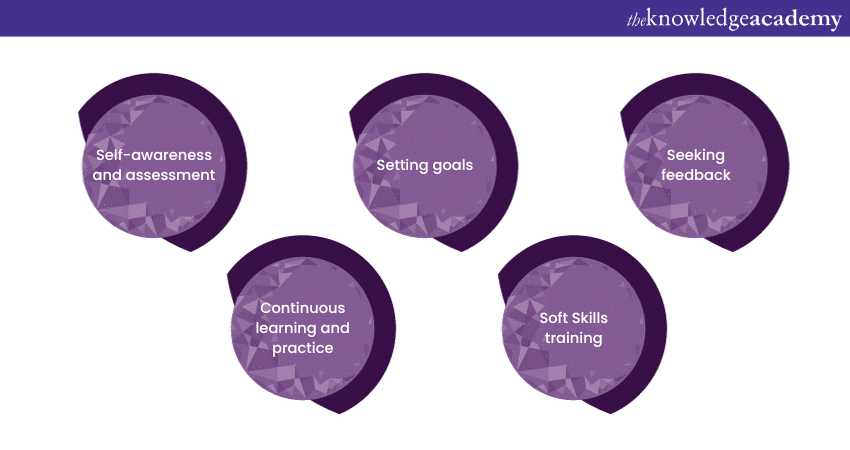We may not have the course you’re looking for. If you enquire or give us a call on +49 8000101090 and speak to our training experts, we may still be able to help with your training requirements.
Training Outcomes Within Your Budget!
We ensure quality, budget-alignment, and timely delivery by our expert instructors.

When it comes to securing a job in the modern job market, possessing technical skills alone is no longer sufficient to succeed. Soft Skills, often overlooked but equally crucial, play a pivotal role in personal and professional growth. In this blog, we will delve into the Importance of Soft Skills, exploring what they are, why they matter, and how to develop and improve them.
Table of Contents
1) What are Soft Skills?
2) Why are Soft Skills important?
3) Types of Soft Skills
4) How do you develop and improve Soft Skills?
5) Conclusion
What are Soft Skills?
In a world where technical expertise is highly prized, Soft Skills might not be as visible, but they are equally essential. Soft Skills encompass a spectrum of qualities and attributes that shape our interactions and relationships with others. These skills aren't about what you know, but rather about how you apply what you know and how you engage with the people and the world around you.
Soft Skills, also known as interpersonal skills or people skills, include communication, empathy, adaptability, problem-solving, and teamwork, among others. They are the intangible skills that determine how effectively you can navigate social situations, work collaboratively, and make a positive impact in your personal and professional life.
Why are Soft Skills important?
This section of the blog will expand on the Importance of Soft Skills in the modern world.

Enhancing communication
Effective communication is the linchpin of success in virtually every aspect of life. It's not just about speaking eloquently; it's about conveying your ideas clearly and comprehending others' messages accurately. In the professional world, miscommunications can lead to costly errors, project delays, and strained relationships.
Consider this scenario: You're part of a team working on a critical project. If you possess strong communication skills, you can articulate your thoughts and ideas clearly during meetings, ensuring everyone understands their roles and responsibilities. Moreover, you can actively listen to your colleagues, valuing their input and promoting a collaborative atmosphere.
On the other hand, a lack of communication skills might result in misunderstandings, frustration, and decreased productivity. This is why employers highly value candidates who can communicate effectively, as it directly impacts a company's bottom line.
Building strong relationships
Developing and maintaining strong relationships is pivotal in both your personal and professional life. Whether you're a teacher, an accountant, a doctor, or an engineer, you'll find yourself interacting with others regularly. Developing empathy and interpersonal skills can make these interactions more fruitful and fulfilling.
Imagine you're a manager leading a diverse team. Your ability to connect with every team member on a personal level, understand their unique needs and concerns, and show genuine empathy can make a world of difference in team dynamics. This not only enhances morale but also boosts productivity and job satisfaction.
In the corporate world, it's often said that people don't leave companies; they leave managers. Leaders who lack Soft Skills often struggle to retain their best talent because they fail to create a positive and supportive work environment. In contrast, those who possess strong interpersonal skills can inspire loyalty and commitment among their team members.
Achieve sales success! Join our Sales Training to learn essential techniques for closing deals!
Problem-solving and adaptability
The modern professional world is characterised by constant change and unpredictability. As a result, the ability to solve problems and adapt is more critical than ever. Soft Skills like critical thinking, creativity, and adaptability empower individuals to face challenges head-on and find innovative solutions.
Let's say you work in marketing, and your team is tasked with launching a product in a highly competitive market. A marketer with strong critical thinking skills can analyse market trends, identify gaps in the competition, and devise a unique strategy to capture the target audience's attention. Similarly, adaptability allows you to pivot when necessary, adjusting your approach to align with evolving circumstances.
In essence, Soft Skills enable professionals to thrive in uncertain situations. They equip you with the agility needed to respond to changes, which can prove to be the difference between a successful career and stagnation.
Leadership and teamwork
Leadership isn't merely about holding a position of authority; it's about inspiring and guiding others towards common objectives. Leadership and teamwork are two Soft Skills that significantly influence an organisation's success.
Consider a scenario in which you're a team leader responsible for completing a complex project. A leader with strong Soft Skills can motivate their team, assign tasks effectively, and create a collaborative atmosphere where everyone's contributions are valued. Such leadership not only enhances productivity but also nurtures a positive workplace culture.
Moreover, the ability to resolve conflicts amicably is invaluable in any team setting. Conflict is natural when diverse personalities come together, but Soft Skills like conflict resolution enable individuals to address issues constructively, fostering harmony and productivity.
Master the art of Sales negotiation for lasting business success with our Sales Negotiation Training. Sign up now!
Types of Soft Skills
Now that we have explored the Importance of Soft Skills, we will list down the different Types of Soft Skills. The following are some common types of Soft Skills:

Communication skills
Communication skills are the foundation of effective interaction. This skill set encompasses not only verbal communication but also written and non-verbal communication. It consists of the ability to express ideas clearly, listen actively, and adapt your style of communication to different audiences and situations.
In a professional context, strong communication skills are essential for presenting ideas persuasively, collaborating with colleagues, and building rapport with clients. Moreover, written communication skills are crucial for crafting clear and concise emails, reports, and documents. Effective communication fosters understanding, prevents misunderstandings, and promotes a positive work environment.
Emotional intelligence
Emotional intelligence is the ability to recognise, manage, understand, and use emotions effectively in interpersonal interactions. This skill enables individuals to navigate complex social situations, build strong relationships, and make sound decisions.
In the workplace, emotional intelligence is particularly valuable. Leaders with high emotional intelligence can empathise with their team members, understand their concerns, and provide support when needed. This fosters trust and loyalty among employees. Additionally, employees with strong emotional intelligence can manage stress, resolve conflicts, and collaborate more effectively, contributing to a harmonious work environment.
Time management
Time management skills involve the ability to prioritise tasks, set goals, and optimise your use of time to achieve objectives efficiently. Effective time management is crucial for productivity and work-life balance.
Professionals who excel in time management can meet deadlines consistently, reduce stress, and maintain a healthy work-life equilibrium. This skill allows you to allocate your time to tasks that truly matter, ensuring that you make the most of your workday.
Problem-solving skills
Problem-solving skills are the capacity to identify issues, analyse them, and develop effective solutions. These skills involve critical thinking, creativity, and adaptability, allowing individuals to tackle challenges systematically.
Consider a scenario where a Software Developer encounters a bug in a complex program. Strong problem-solving skills enable them to identify the issue, trace its origins, and implement a solution efficiently. This ability not only saves time but also enhances the quality of work.
Leadership skills
Leadership skills extend beyond holding a leadership position. Leadership involves inspiring and guiding others towards achieving common goals. Effective leaders possess skills such as communication, empathy, and strategic thinking.
Leadership skills are especially crucial for managers and team leaders, but they are also beneficial for individual contributors. Strong leadership skills can empower you to take initiative, collaborate effectively, and influence positive change within your organisation.
Adaptability
Adaptability is the capacity to adjust to new conditions and changes quickly. The ability to adapt is invaluable as it enables individuals to thrive in uncertain circumstances and embrace innovation. For example, a marketing professional may need to adapt to new digital marketing trends regularly. Those who are adaptable can quickly acquire new skills, stay ahead of the curve, and capitalise on emerging opportunities.
Improve your Soft Skills by signing up for our Soft Skills Training For Sales Professionals!
How do you develop and improve Soft Skills?
This section of the blog will tell you how to develop as well as improve your Soft Skills:

Self-awareness and assessment
Self-awareness is the first step towards developing Soft Skills. It involves introspection and an honest assessment of your strengths and areas for improvement. Take time to reflect on your communication style, emotional reactions, time management habits, and problem-solving approach.
One effective method is to seek feedback from colleagues, friends, or mentors. They can provide valuable insights into your Soft Skills and areas where you might need development. Self-awareness allows you to identify specific areas to focus on, making your efforts to improve more targeted.
Setting goals
Setting clear and achievable goals is necessary for improving Soft Skills. Instead of vague objectives like "become a better communicator," break down your goals into specific, measurable, attainable, relevant, and time-bound (SMART) targets.
For example, if you want to enhance your communication skills, your SMART goal might be: "I will actively participate in team meetings, offering at least one valuable contribution in each meeting, for the next three months." This approach provides clarity and motivation, helping you stay on track.
Seeking feedback
Feedback is a powerful tool for growth. Actively seek feedback from colleagues, mentors, or coaches regarding your Soft Skills development. Constructive criticism can offer insights into areas where you can make improvements. Additionally, self-assessment tools and 360-degree feedback assessments can provide a structured way to gather feedback and track progress over time. Embrace both positive as well as negative feedback as opportunities for growth.
Continuous learning and practice
Improving Soft Skills is an ongoing process that requires dedication and practice. Consider these strategies for continuous improvement:
a) Learning resources: Invest in books, courses, workshops, or online resources related to the Soft Skills you want to develop. For example, you can register for a public speaking course to enhance your communication skills.
b) Role models: Identify individuals who excel in the Soft Skills you want to improve. Study their behaviours and approaches, and try to emulate them. Role models can provide valuable guidance and inspiration.
c) Practice: Soft Skills improve with practice. Engage in activities that challenge you to apply your skills regularly. If you want to enhance your leadership skills, take on leadership roles in volunteer organisations or lead small projects at work.
d) Journaling: Keep a journal to track your progress. Reflect on your experiences, noting situations where you applied your Soft Skills effectively and areas where you faced challenges. Journaling can help reinforce your learning and identify patterns in your behaviour.
Soft Skills training
Many organisations offer Soft Skills training programs for their employees. Take advantage of these opportunities if they are available in your workplace. Such programs often include workshops, seminars, and coaching sessions focused on specific Soft Skills. Additionally, consider seeking external training or certification in areas that align with your career goals. For example, if you're in a leadership role, pursuing a leadership certification can provide valuable knowledge and skills.
Conclusion
Soft Skills have become a high-demand necessity in every modern-day organisation. The Importance of Soft Skills is paramount, as recruiters monitor the candidates’ behaviour, attitude and communication skills when interviewing for a role. Therefore, it is always essential to have a strong set of Soft Skills as they help you accomplish goals, succeed in your career and get you a leadership role in management.
Elevate your Sales expertise with our Sales Management Masterclass by empowering your team and transforming your results!
Frequently Asked Questions
Upcoming Business Skills Resources Batches & Dates
Date
 Sales Bootcamp
Sales Bootcamp
Fri 10th Jan 2025
Fri 14th Mar 2025
Fri 9th May 2025
Fri 11th Jul 2025
Fri 12th Sep 2025
Fri 14th Nov 2025







 Top Rated Course
Top Rated Course



 If you wish to make any changes to your course, please
If you wish to make any changes to your course, please


